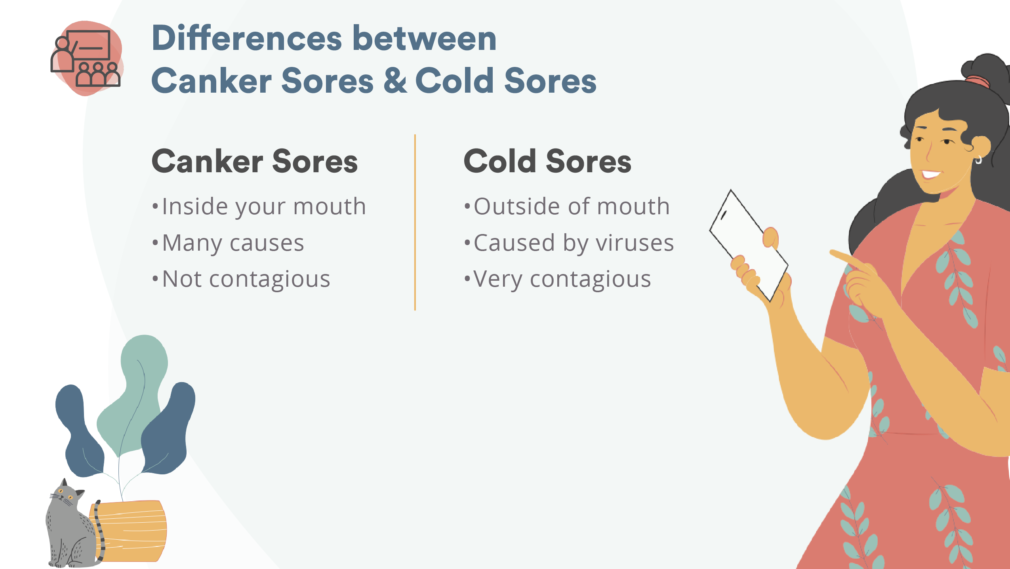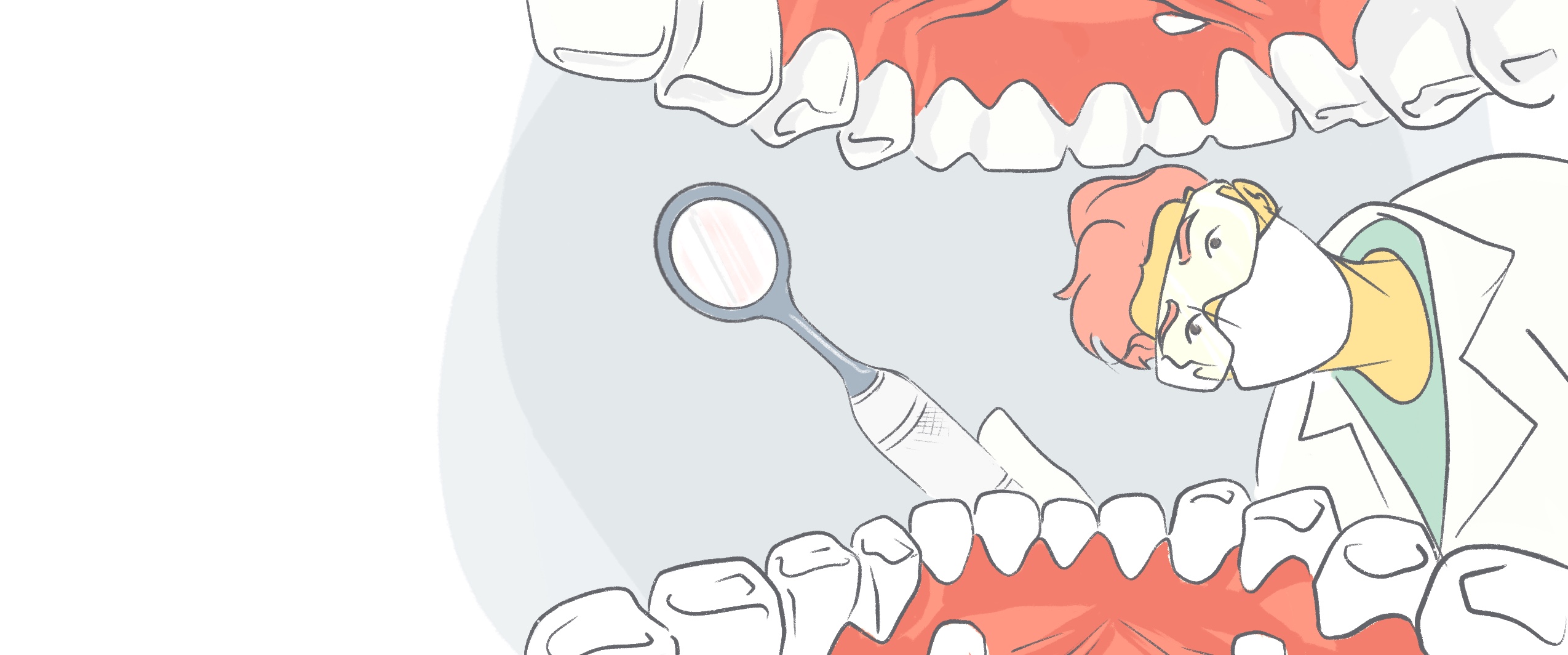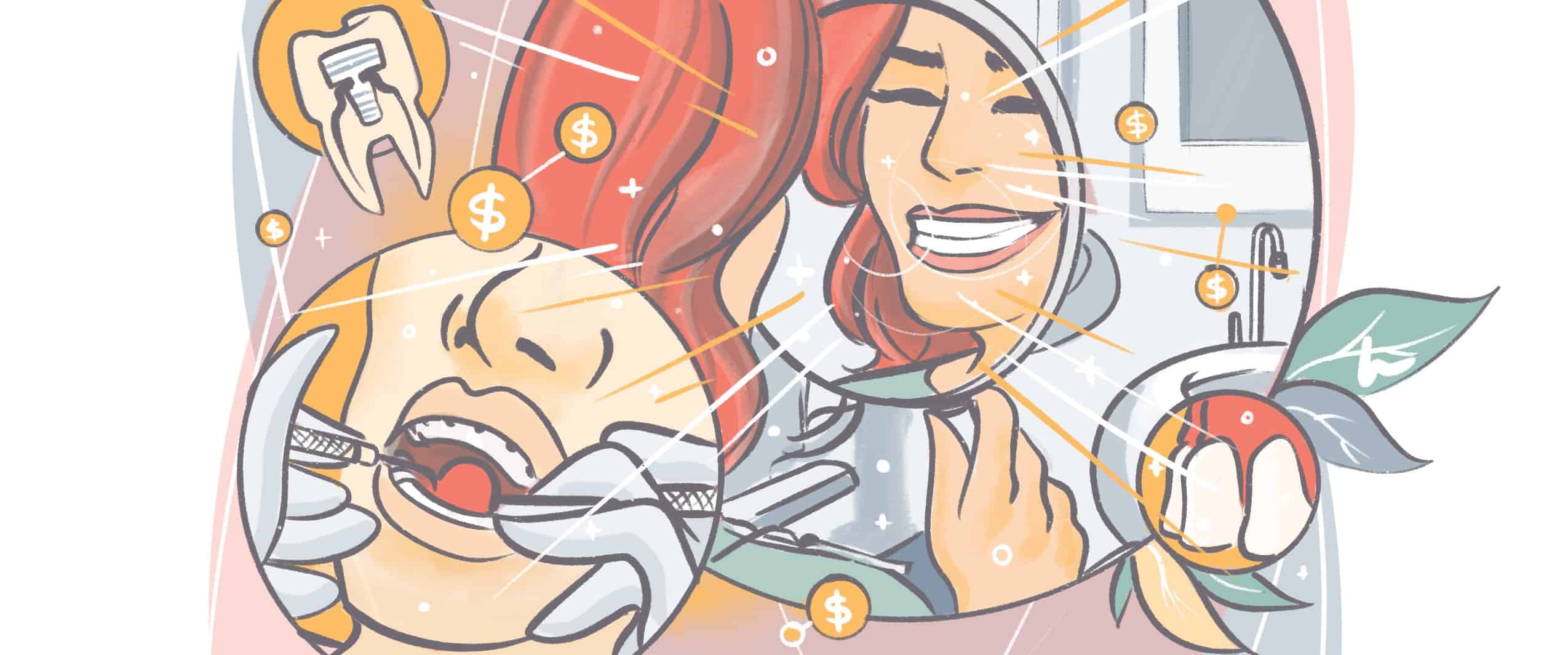JUMP TO: Canker Sores / Cold Sores / Leukoplakia / Oral Lichen Planus / Oral Thrush / Book a dentist online to diagnose
Is the inside of your mouth feeling uncomfortable? Do you notice painful white patches in your mouth? There are many reasons for these pesky white spots. And yes, while left untreated they may go away, however these white patches can be connected to health conditions that will need to be treated by either your doctor or dentist. If you noticed any of the symptoms above, keep reading to find out how you can get them under control.
Identifying your white patches
Canker Sores and Cold sores
Canker sores also called apthous ulcers, are often confused with cold sores, but they are completely different. A canker sore is an ulcer that develops on the inside of your mouth. A cold sore is a viral infection, found on the outside of the mouth, usually the lips, and appears as a small fluid like blister. Unlike a canker sore, a cold sore is caused by the herpes Simplex Virus (HSV) and can be easily spread if left untreated. A canker sore is more of a painful annoyance which can be left untreated.
Canker sores are one of the most common mouth complaints. Most people who have canker sores only experience them infrequently; however, around 20% to 30% have recurrent outbreaks. You might notice that a canker sores pops up three or four times a year and lasts for about a week. Complex canker sores are larger, more painful, and may last up to a month.
Causes of Canker Sores
Many things can cause a canker sore like: hormonal changes, stress, and physical mouth trauma Certain foods can also cause canker sores like citrus fruits. Vitamin deficiencies, such as vitamin B12, iron, folic acid, and zinc can also add to the problem.
Symptoms of Canker Sores
Canker sores form on the soft tissues of the mouth and gums. They are round or oval, and the edges are red, while the center is white or slightly yellow. You may feel a burning or tingling sensation before onset. Another symptom is a stinging pain, especially when you talk or eat.
Still need answers? Get $50 when you see a dentist.
Your dentist can help prevent and treat your white patches. Earn $50 for booking!
Treatments for Canker Sores
To help treat your canker sores, rinse your mouth with saltwater or a baking soda and water mix. You can also put a small amount of milk of magnesia directly onto the sore. Both of these methods can be done several times per day.
You should make a dentist appointment if your symptoms last over two weeks, get worse with home remedies, occur several times per year, or are severe. If your canker sores are combined with symptoms such as headache, fever, diarrhea, or skin rash, seek medical attention. Treatments for canker sores are aimed to ease the symptoms, reduce inflammation, and prevent secondary effects, such as a bacterial infection. They don’t guarantee you won’t develop these ulcers again in the future.
You may be prescribed one of three things to treat the infection and relieve pain like a steroid mouth rinse, anesthetics, or antibiotics to reduce inflammatory irritation.
Canker Sores Prevention
In general, canker sores are difficult to predict and prevent. Fortunately, once they’ve appeared, there are ways to ensure the situation doesn’t worsen. Try to avoid contact with your canker sores. Don’t continually touch them with your tongue and be careful when brushing your teeth. Avoid spicy, hot, and acidic foods and beverages. Also try not to eat sharp foods, such as chips.
Cold sores

Leukoplakia
Leukoplakia should be taken seriously. While the majority of leukoplakia cases are benign, some can be precancerous.
Causes of Leukoplakia
Chewing tobacco and chronic smoking might cause leukoplakia, among other dental issues. Ill-fitting dentures, HIV or AIDS, and sun exposure to your lips have also been shown as possible causes of leukoplakia. In rare cases, oral cancer can be connected to leukoplakia as well.
Symptoms of Leukoplakia
Thick, white patches in your mouth that cannot be easily scraped off is the main symptom of leukoplakia. These patches can be flat or irregularly-shaped and tend to harden or thicken r over time. In severe cases, you may experience mild discomfort or pain when swallowing. Red lesions (erythroplakia) may appear. Leukoplakia with red lesions is more likely to be cancerous or precancerous.
Treatments for Leukoplakia
Anybody who has been diagnosed with leukoplakia, should stop using tobacco products immediately. If it’s determined your leukoplakia is caused by ill-fitting dentures, a rough tooth, or an irregular filling surface, a dentist can fix that problem. In the case a weakened immune system is contributing to your leukoplakia, you might be prescribed antiviral medications or topical treatments.
It’s important for your dentist or doctor to take a biopsy of your leukoplakia to rule out cancer. If necessary, it will be removed through oral surgery.
Leukoplakia Prevention
Once you have had leukoplakia, it can come back again. We suggest booking a follow-up appointment with your doctor and dentist.
Quitting both tobacco use and smoking is one of the best ways to prevent leukoplakia. Maintaining good oral hygiene goes a long way towards preventing leukoplakia. Another tip is to reduce alcohol and eat a diet rich in antioxidants.
Oral lichen planus
Oral lichen planus is an autoimmune condition characterized by the inflammation of mucous membranes in your mouth. Lichen planus can affect any lining mucosa, such as esophageal or vaginal mucosa, but it most commonly affects the oral cavity. Only 2 % of the population (and mainly older women) suffer from Oral lichen plus.
Causes of Oral lichen planus
Some experts suspect genetics and immunity may play a role. Others believe lichen planus might be an autoimmune disorder or a cell-mediated immune response. There’s been documented connections between oral lichen planus and the use of beta-blockers and nonsteroidal anti-inflammatory drugs.
Symptoms of Oral lichen planus
Oral lichen planus causes white, lacy patches to form. Other symptoms include burning pain, bleeding gums while eating or brushing teeth, redness, open sores, and swelling. You might also experience a sensitivity to acidic or hot food.
Treatments for Oral lichen planus
Although there’s no cure for oral lichen planus, the symptoms can be managed. A dentist or doctor may prescribe topical, oral, or injectable corticosteroids to reduce inflammation. You may also be prescribed numbing gels to help decrease any pain.
Additionally, some people may receive medications to suppress or control the immune system. Be aware oral lichen planus can raise your risk of secondary infections, nutritional deficiencies, and oral cancer. It’s highly recommended for those with oral lichen planus to have regular checkups.
Oral lichen planus Prevention
Although oral lichen planus may not be totally prevented, you can lower your risk of developing it by eating a healthy diet rich in fruits and vegetables and by limiting alcohol and tobacco use.

Oral Thrush
Everyone has a small amount s of the candida fungus in their mouths, digestive tracts, and skin. These are kept at healthy levels by other bacteria and microorganisms. However, this balance can get thrown off and if the fungus candida grows too much, you can develop oral thrush.
Causes of Oral Thrush
There are several reasons you might develop oral thrush (a candida overgrowth) such as: medications like antibiotics, birth control pills, and corticosteroids.. You can also develop oral thrush if you have cancer, uncontrolled diabetes, HIV infection, dry mouth, or are pregnant.
If you smoke, wear improperly-fitted dentures, are breastfeeding an infected baby, or have poor oral hygiene a candida overgrowth can occur
Symptoms of Oral Thrush
Oral thrush can appear as white sores that are slightly raised with a cottage cheese appearance.Typically the sores appear on the tongue or inner cheeks, but can be found on the gums, tonsils, roof of the mouth, or back of the throat.
Oral thrush may give you a cotton-like feeling in your mouth. It can cause irritation,pain, a loss of taste, redness, and cracking or bleeding at the corner of your mouth. If you notice these symptoms, get yourself to the dentist or your family doctor.
Treatments for Oral Thrush
Remedies that help fight oral thrush include gargling with salt water, quitting or reducing tobacco use, limiting sugar, and using an antibacterial mouthwash. Your dentist or doctor may also prescribe you an antifungal medication.
Oral thrush may be a symptom of another medical problem, your dentist may recommend speaking with a doctor about any possible underlying health issues.
Oral Thrush Prevention
Good oral hygiene is the best way to prevent oral thrush.
Brush and floss daily, if you wear dentures, clean them every day, and make sure to see a dentist regularly. If you use a corticosteroid inhaler, make sure to rinse your mouth after taking the medication. Treat vaginal yeast infections quickly. Limit your sugar intake, and if you have diabetes, make sure to keep your blood sugar levels stable.
Worried About White Patches?
Want to once-and-for-all to determine the cause of the white patches in your mouth? Start by finding a dentist in your area with Opencare.
Still need answers? Get $50 when you see a dentist.
Your dentist can help prevent and treat your white patches. Earn $50 for booking!









